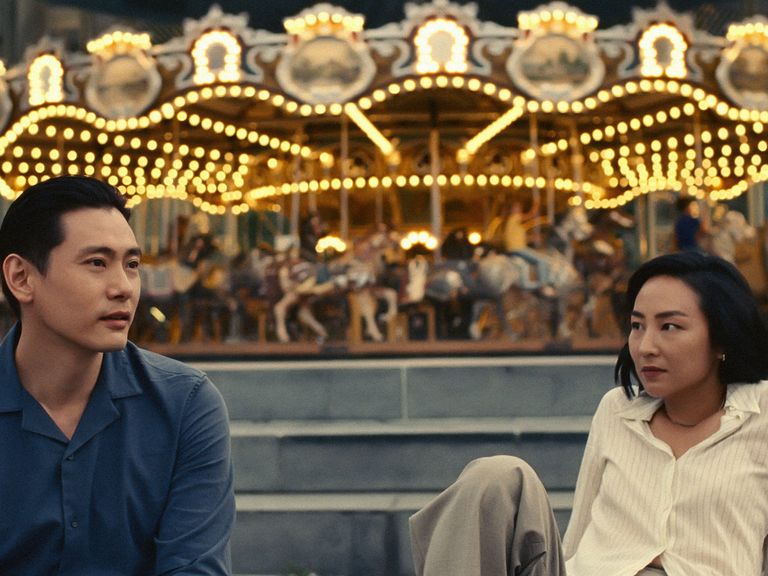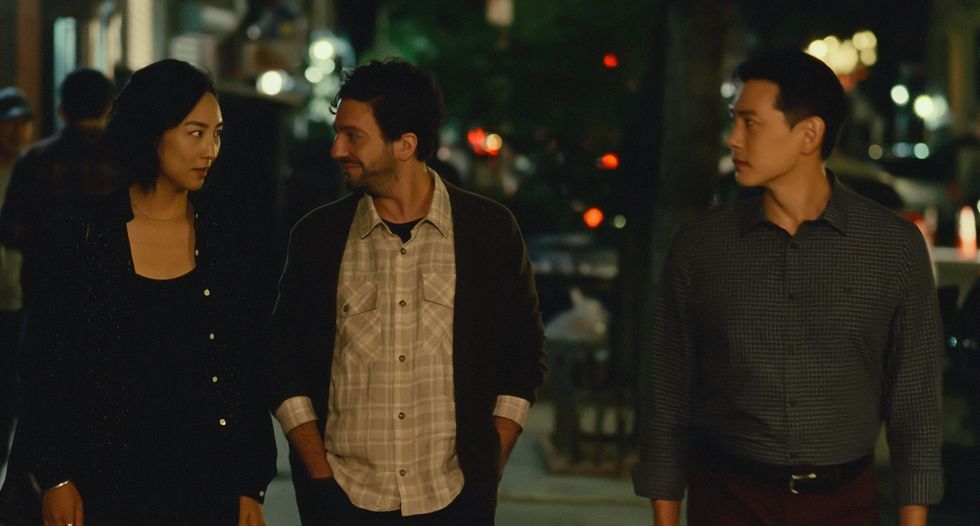What is left to say about love? More accurately, what else is there for films to tell us about love? Boy meets girl, boy breaks girl’s heart, boy makes up with girl: variations of this tried-and-tried cycle have been deluding and distracting us for decades. At first glance, Past Lives, a love story that was rapturously received at Sundance this year, appears to rock no romantic boats. It opens with a girl and two boys at a counter, as a couple attempts to delineate their relationship; how these people could have ended up at this bar, at this time, in this combination. (Anyone who has ever been lost for conversation on a date, circling the dregs of a lukewarm martini, will surely relate to such last resort people-watching.) But swiftly, we travel decades in the past to discover more about two thirds of this trio, and the film begins a fresh story: of love, lost, found, and deferred.
Na Young (Greta Lee) and Hae Sung (Tee Yoo) grow up in South Korea. They are fast friends, even going on a play date, chaperoned by their mothers. But soon, Na Young’s family emigrates to Canada and she chooses a new name: Nora. 12 years later, Nora lives and studies in New York with the hope of becoming a writer. They reconnect on Facebook (remember that?) and then talk over Skype endlessly (remember that?). Nora ends that burgeoning relationship – and anyone who knows the ins and outs of a long-distance romance, punctuated by dopamine-filled notifications and long stretches of screen-gazing will perhaps sympathise – to embrace life more fully. Which she does, over another 12-year jump. I’m not sure you can exactly spoil a film like this, which has a lifelike rhythm of both mundanity and inevitability, but a love triangle involving Nora’s partner, Arthur (John Magaro, who brings warmth to a potentially despicable role), provides momentum for the last act.
The film, at once strikingly intimate and lived-in, has all the hallmarks of a creator who has been thinking about these themes and perhaps experiencing some of them for herself for decades. Writer-director Celine Song was indeed born in South Korea; her family moved to Canada when she was 12, and she later studied for her MFA at Columbia. Her debut play, Endings, about three Korean woman and a Korean-Canadian writer, opened on off-Broadway in March 2020. You know what happened to the world after that. In the midst of the pandemic, she launched a production of The Seagull on The Sims 4 via gaming platform Twitch, a mad-libs that could only have existed in 2020. That inventiveness remains in Past Lives, her feature film debut. A last-act bar scene, which loops neatly into that opener, provides a daring, emotional whack
Running through the film, which clocks in at a breezy 100 minutes, is the Korean concept of inyeon. The word is untranslatable (according to several blogs and Tumblr posts I have read about the concept) but means something a little like fate or providence (according to Nora, at least). Such sentimentality could overwhelm a film but Song’s script treats the concept with both reverence and scepticism. It is both driving force that helps Nora and Hae Sung understand their bond, and a woo-woo concept they gently ridicule. “That’s just something Koreans say to seduce someone,” Nora says at one point, after some romantic courting at a writing retreat (wouldn’t that be nice?). Yet it’s a convincing main character, one which Nora and Hae Sung embrace, wrestle with, and succumb to in unusual ways. That delicate balance wouldn’t work without Lee’s remarkably expressive face (it is tedious to mention awards in the middle of, uh, summer, but the actor deserves to be in discussion for top prizes) and Yoo’s boyish, vulnerable charm.
There are many easy references to make. The dialogue, not laugh-out-loud funny, has the wit of a ‘90s British rom-com. Its third act provides a genuine dilemma that recalls romantic films with actual stakes. Most obviously, the film shares Before Sunrise’s naturalistic approach to romance (actually, it plays like all of Linklater’s trilogy rolled into one). And like those films, Past Lives is hung up on the interplay of wonder and complication. Isn’t it amazing that these people met, right here, in this lifetime? Isn’t it marvellous Nora’s mother set up a childhood playdate? Aren’t their friends so understanding? But it is always undercut by just how unfair the world is. Why do these people live countries apart? Why do we need visas, anyway? Are time differences strictly necessary?
Perhaps most intriguing is the film’s exploration of technology, and how it connects and disrupts us in the 21st century, reminiscent of a Sally Rooney novel (though it’s a more compelling depiction than either screen adaptation of the author’s first two books). Nora, skipping around New York, imagines a life with Hae Sung, a man she instinctively gets and is tied to her roots (a literal past life). Hae Sung, a little lost back in South Korea, yearns for his childhood sweetheart: a symbol of simpler times, and now faraway lands. Can that person, who you’ve built up over texts, video calls, shared photos, possibly match those dizzying expectations? You keep track of time differences, and friendship groups, and work strife. Of good moods, and bad days. But what if they’re not the person of your dreams? And what, more alarmingly, if they are?
‘Past Lives’ is playing in US cinemas now, and will be released in the UK 8 September
Henry Wong is a senior culture writer at Esquire, working across digital and print. He covers film, television, books, and art for the magazine, and also writes profiles.














